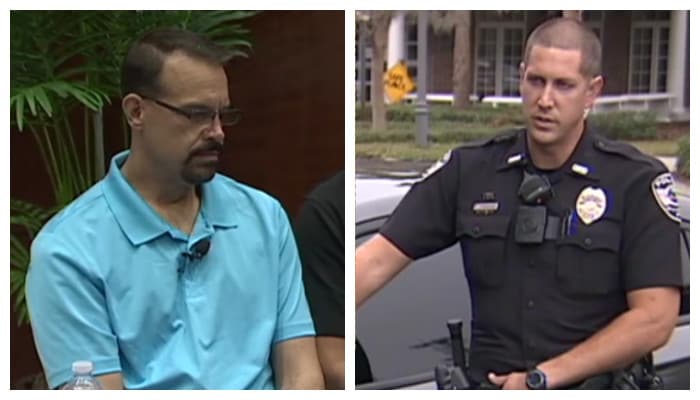A “chain” of kidney donations involving eight people helped save the lives of four individuals including a police officer from Florida. Doctors at the Florida Hospital Transplant Institute in Orlando organized the kidney exchange that ended up helping people across the country, ABC News reported.
“This transplant chain was made possible by heroes — people willing to give their kidney in order to save another person’s life,” Dr. Bobby Nibhanupudy, medical director of Florida Hospital’s abdominal transplant program, said in a statement. “Thousands of people are waiting for life-saving transplants. This paired exchange is proof that you could be a match to someone — maybe across the country — and become their hero too.”
Typically it can take years to receive a kidney for people on the transplant list. Often people who are waiting have a relative or friend who would happily donate, but they’re not a genetic match. Through a federal exchange program called the Organ Procurement and Transplantation Network, doctors can find matches for people in need, while their healthy loved ones “pay it forward” by donating an organ to someone else.
“We tell them, ‘You’re not able to donate to this person, but there’s the paired exchange program, where we put you guys into a computer database with other pairs in the same situation,'” said Christina Burnett, who is a donor transplant coordinator at Florida Hospital Transplant Institute. “We try to find a match for both of you at the same time. So it’s an equal exchange.”
The idea of paired organ exchange is growing in popularity: in 2016, the network recorded a record 625 paired donations in the United States. Still, a lot has to line up to keep a chain going across so many donors and recipients.
Seminole County Deputy Blayne Badura had been on dialysis multiple times a week and would have had to wait another five to six years if not for the kidney chain, the Orlando Sentinel reported. A fellow law enforcement official, Bobby Draughon, of the Oviedo Police Department, decided he wanted to donate his kidney to help Badura, who he met on the job.
https://www.youtube.com/watch?v=W4RqEa5lEPM
“He would step out on traffic stops with me and back me up,” Draughon said.
The police officer found out about the deputy’s need for a kidney when he saw a GoFundMe page Badura’s wife had set up.
“I thought, ‘I’m healthy and this is something I can do,'” Draughon said.
Draughon wasn’t a match, but doctors explained the exchange program to him.
“They said my kidney wouldn’t go to him, but it would ensure that he receives one in return [if I donated my kidney],” Draughon said. “So I said, ‘As long as he can get a kidney, that’s all that matters.'”
Badura received his kidney from Lauren Gau, 26, who donated her kidney to the exchange when she wasn’t a match for her mom. Her donation secured a kidney for her mother donated by another person further up the chain, whose loved one had received a kidney from someone still further up.
Finally, Draughon kept the exchange going by donating his kidney to someone in need in the Pacific Northwest. That person’s family member is still waiting to be matched and donate a kidney; when they do, it will continue the chain.
The eight-person kidney exchange meant “that everybody is going to get transplanted, and they’re going to get to donate,” Burnett said. “It’s awesome.”
Badura said of the exchange: “It’s a complete miracle.”
Draughon told reporters he couldn’t be happier with his decision.
“I couldn’t feel better. And to help more than one person at once is more than what I bargained for,” the police officer said. “Donating a kidney is life-altering, but it’s not going to change [the] quality of your life at all. It’s something that people should seriously consider.”




